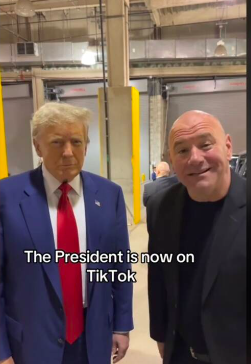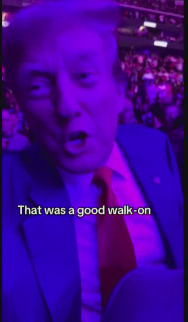Global business: ByteDance ramps up its U.S. lobbying, campaign donations as TikTok ban advances
- Li Ruojia

- Jun 18, 2024
- 7 min read
Updated: Jul 11, 2024

Part 1 of a three-part series
By LI RUOJIA and LI LEYAO
Global Business Journalism reporters
TikTok is facing unprecedented challenges.
On April 24, President Joe Biden signed a law which forces ByteDance to sell the popular video sharing social media site or face a ban in the United States on Jan. 19, 2025. If the site is barred from app stores, it would be the first American limit on free speech based on country of ownership in the social media age.
The White House and bipartisan backers of the plan cite potential U.S. national security threats as justification for their demands to end Chinese-based ownership of TikTok. And while the heated political rhetoric, the raucous congressional hearing featuring TikTok CEO Shou Zi Chew and the company’s sharply worded lawsuit against the U.S. government made headlines, most of the fight for TikTok’s survival is taking place quietly, outside of public view, news headlines and social media.
Who was – or is – being hired by TikTok for lobby? What legislation is this all-star line-up focusing on? With the data from OpenSecrets and the Lobbying Disclosure Act (LDA) reports, it is possible to examine the company's behind-the-scenes survival strategy.
Lobbying strategy: Democrat or Republican?

In response to these its ongoing challenges, TikTok has actively engaged in substantial lobbying efforts to shape its destiny within the American market, demonstrating a proactive stance in navigating the complex and hostile regulatory environment it faces.
An examination of Lobbying Disclosure Act reports and data from the OpenSecrets.org website reveals a multi-pronged approach including a spike in political donations and beefed-up hiring of influential lobbyists from both political parties. But the latest disclosure reports note one significant shift in TikTok’s strategy: Unlike 2022, when the company focuses on trying to win the votes of Republicans who were threatening to ban the popular video sharing app, TikTok is generously donating to both parties this year.
In the evolving political landscape of 2024, ByteDance, the parent company of TikTok, donated both to President Joe Biden ($4,386) and former President Donald Trump ($1,800). It supported Republican Representative Mark Green, the chairman of the House Homeland Security Committee and a harsh critic of the Chinese Communist Party, and Vince Fong, who won the California congressional seat vacated by former House Speaker Kevin McCarthy.
A pivot to Senate Democrats in 2024
TikTok's overall giving reflects the balance of power: to Republicans who control of the House and Democrats who control of the Senate. But a detailed examination of these transactions indicates a decisive shift in ByteDance's overall funding, with a higher percentage of its expenditures this election cycle favoring the Democratic Party over the Republican Party. This strategic pivot is a significant change from ByteDance's prior strategy in 2022, which primarily supported Republican figures. Further analysis of the average contributions reinforces this trend, showing a stronger affiliation with the Democratic Party.
The shift toward Democratic donations coincides with President Biden’s agreement to sign Republican-led legislation to force the sale of TikTok, as well as Democratic control of the U.S. Senate and the government’s Executive Branch, which would write rules governing the forced sale or subsequent ban.
The bill H.R. 7521 that rapidly cleared the Republican-led House on March 13, aimed at regulating TikTok, hinges on final approval from the Senate, where Democrats narrowly hold sway. An examination of ByteDance’s 2024 campaign donations show that the company’s political committee sent money to Senate Democrats including Jacky Rosen of Nevada, Maria Cantwell of Washington and Martin Heinrich of New Mexico. No Senate Republicans have received donations to date in 2024.
Despite its bipartisan origins, Senate Majority Leader Chuck Schumer has not yet committed to a floor vote. President Biden has indicated he would sign the bill if it passes. So for TikTok, the critical task in is to convince the Democrat-controlled Senate to block the bill, which is essential for preventing potential restrictive actions against the app, used by 150 million Americans.
On the other hand, the Democratic Party has historically had a closer relationship with TikTok, leveraging the platform extensively for voter outreach, especially among young voters who were pivotal in President Biden's 2020 victory. The Biden campaign and Democratic accounts like @BidenHQ and @thedemocrats have amassed loyal followings on TikTok. This investment underscores the party's reliance on the platform to connect with the younger electorate, which might react negatively to restrictions on their favorite app.
TikTok's new friend: Donald Trump
TikTok's relationship with Republicans is more complicated. The TikTok ban has been pushed most aggressively by Republicans. And while it had strong support on both sides of the political aisle in the House of Representatives, it had more support among Republicans. Many liberal Democrats opposed it because they said it violated the free speech guarantees of the First Amendment of the U.S. Constitution.
And then there's Donald Trump. In 2020, then-President Trump sought to ban the app in the U.S. unilaterally through an executive order. His action was ultimately overturned by a federal judge as an abuse of presidential power.
Recently, however, Trump unexpectedly shifted his position and started to embrace TikTok. This abrupt change was attributed by some U.S. political analysts as a strategic shift that could attract young voters from Biden, who has promised to sign the Republican-backed TikTok ban.
Trump has used his social media platform, Truth Social, to accuse the Democratic incumbent of being "responsible for banning TikTok." He further claimed, without evidence, that Biden aimed to shut down TikTok to benefit his associates at Facebook, enhancing their dominance and ability to combat the Republican Party, potentially through illicit means.
"Without TikTok, you can make Facebook bigger," Trump posted on his own social media site, "and I consider Facebook to be an enemy of the people along with a lot of the media.”
Trump's sudden shift has angered some of his longtime friends and advisers. Steve Bannon, a right-wing media personality and former 2016 Trump campaign official, accused Trump of being influenced by Republican megadonor Jeff Yass, whose company owns a stake of about $40 billion in ByteDance. Trump met with Yass at his Mar-a-Lago business in Florida shortly before reversing course. Previously, his position was clear: “As far as TikTok is concerned, we’re banning them from the United States."
Trump's new position has not slowed down Republican efforts on Capitol Hill to bash the app throughout the 2024 presidential election cycle. “He’s getting bad advice from somebody. I don’t know why,” Texas Republican congressman Dan Crenshaw told POLITICO.
Future challenges for TikTok lobbying
The sell-or-ban legislation is just the loudest fight TikTok faces in Washington. The social media company finds itself in a constant struggle against hostile lawmakers. Its parent company, ByteDance, recognizes the gravity of the situation and has intensified its lobbying efforts.
According to data from OpenSecrets.org, ByteDance has spent over $23.9 million on federal lobbying since launching its influence operations in 2019.
This substantial investment has been allocated to nine bills in Congress, all of which center around the societal impact of TikTok. These bills examine concerns topics such as addiction among children and the potential theft of personal information belonging to American citizens.
In 2023, ByteDance set a new spent more money than it ever had before on lobbying, as it faced increased congressional scrutiny over its ties to the Chinese government.
As Congress continues to exert pressure on TikTok through incremental steps, the situation has deteriorated further. In the first quarter of 2024, ByteDance's federal lobbying spending reached nearly $2.7 million, surpassing the lobbying expenses of any previous quarter with the exception of the third quarter of 2023.
“This expenditure reflects work we do to educate policymakers about how legislation could affect our community of 170 million American users,” a TikTok spokesperson told CNBC.
What the law would do
The final version of the bill provides TikTok with a nine-month window to divest before the ban takes effect. Initially, the House had passed a version of the legislation in March that allowed TikTok only six months to comply. This shorter timeframe would have compelled ByteDance to divest TikTok or cease its U.S. operations before Election Day. The final version pushed back a possible ban until after the election.
The divestiture deadline is set for 2025, but it can be extended to a year by the president. Consequently, the extended timeframe grants the incoming president, elected in November, the authority to decide whether to grant TikTok additional time.
Trump has made it clear that he does not support any such ban. If a newly reelected Biden approves a ban, the American court system will be the final arbiter of the situation.
Social media's challenges
TikTok is not the only social media company to increase spending on lobbying or campaign contributions. Meta, the parent company of Facebook and one of TikTok's main competitors, also broke records in the first quarter of 2024 by spending a total of $7.6 million on federal lobbying.
Meta has its own challenges. Trump and Republicans accuse it of censoring conservative voices and perverting family values. Liberals and conservatives alike blame Meta and other social media platforms of damaging the mental health of young people, particularly teen-aged girls, with their algorithms that emphasize ideals of beauty and allegedly reward hate speech and bullying.
Even if TikTok survives its existential challenge of 2024, it faces lobbying issues in the years ahead. So it seems unlikely that the company's current political engagement is a passing phase.
Note: After this article was published, the proposed legislation was approved by the Senate and signed into law by President Joe Biden. It is being challenged in United States federal court by TikTok, a group of TikTok content creators and a coalition of free speech advocacy groups and racial justice groups.









תגובות